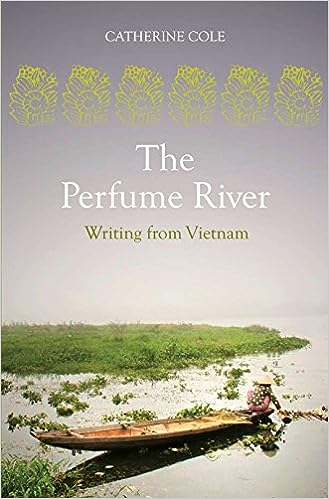
- Free Article: No
- Contents Category: Fiction
- Review Article: Yes
- Article Title: No nirvana
- Online Only: No
- Custom Highlight Text:
The Perfume River crosses the city of Hue, in the centre of Vietnam. Like tributaries that flow into the main body of water, this anthology of short stories and poetry crosses temporal and geographical boundaries, with Vietnam as the locus point. As editor Catherine Cole says in her introduction, ‘For all Vietnam has defined itself as a voice of inspiration, of homeland, memory and discovery’. The subtitle is not quite accurate, as it implies that all the creative pieces originate within the country, whereas the contributions come from various sources: from Vietnamese nationals living in the motherland, but also from second-generation Vietnamese contemplating home from afar, and from non-Vietnamese who nonetheless have an affinity with the land and its culture. With both insider and outsider perspectives, ‘writing of or about rather than from Vietnam’ might have been a more apt subtitle.
- Book 1 Title: The Perfume River
- Book 1 Subtitle: Writing From Vietnam
- Book 1 Biblio: UWA Publishing, $32.95 pb, 320 pp
- Book 1 Cover Small (400 x 600):

The first three offerings attest to the legacy of war seared into the nation’s consciousness. The book opens with a powerful excerpt from Bao Ninh’s 1991 novel, The Sorrow of War, about a missing-in-action team waiting for the rain to stop so they can remove corpses from the ‘jungle of screaming souls’ in the central Highways. Nam Le’s painfully evocative short story which touches upon the My Lai massacre, ‘Love and Honour and Pity and Pride and Compassion and Sacrifice’, is followed by Lam Thi My Da’s poem ‘A Sky in a Bomb Crater’, which loses none of its haunting beauty in translation. Then, just when you think the anthology might be immersed in the blood, bones and petrified memory of war, it jolts forward to contemporary times in a piece by Vietnamese-Australian Chi Vu, which is about the return to Hanoi of a ‘Viet Kieu’ – a Vietnamese expat. Here, the city is busily shedding its skin like a snake, with infrastructural change and the ‘doi moi’ (renovation) inspiring the young and the restless to capitalistic fervours.
As a counterpoint to the war-scarred devastation, there are bountiful romantic, postcard-pretty images in the collection: homages from the natives, but also from outsiders entranced by a vision of pastoral purity. In his poem ‘Red Dzao Village’, Steve Kelen waxes lyrical: ‘No guide book describes the ecstasy / brought on by a breeze blowing down terraced fields / of rice green, green full of water – Asia green.’ In another poem, the frenetic street life in the capital is celebrated: ‘What greater joy could there be than to see / Hanoi girls ride motor scooters / pillion sisters sitting side saddle ...’ Lest the reader become too attached to rose-coloured glasses, in a piece about Vietnamese artists Christopher Kremmer paints modernity in more sobering colours: ‘Yet new Hanoi is no nirvana. The old problems – poverty, political control and isolation – have been replaced by new ones – over-population, insensitive development and conspicuous consumption.’
As a whole, The Perfume River explores numerous familiar themes: war and nostalgia, diaspora, rural and urban spaces, and so forth. What is particularly revelatory about this anthology are the accounts of domestic lives of ordinary Vietnamese, with a number of the poems and fiction translated from the original. Cole has taken it upon herself to champion and showcase contemporary Vietnamese authors such as Pham Thi Hoai, Nguyen Ngoc Thuan and Lam Thi My Da, names recognised in their own homeland but largely denied a Western audience. Hence, familial, romantic and sexual relations are all canvassed from the perspective of native Vietnamese. In Le Minh Khue’s ‘The Professor of Philosophy’, for instance, a cynical exercise in entrapment by an impoverished student develops into symbiotic love. Meanwhile, Nguyen Thi Thu Hue warns about the perils of women being flirtatious and exhibitionistic in a culture that values modesty.
There is much to recommend The Perfume River, but one editorial shortcoming is a seeming lack of organisation. The book is not set out in chronological order; nor are the stories and poems divided into thematic categories. Perhaps Cole intended the collection to be as non-restrictive, amorphous and fluid as her titular river. However, it would have been helpful if each work was dated – the reader has to trawl through the permissions and acknowledgments section to form a sense of where each piece sits historically. There are a few original works, but most have been published elsewhere, and with thirty-two contributors, and a fusion of past and present, the cacophony of voices needs more cohesive direction from Cole.
Another idiosyncrasy is the overrepresentation of Hanoi. Steve Kelen rhapsodises about Hanoi girls, Chi Vu also bases her psychic guide there, as does Pham Thi Hoai in ‘Sunday Menu’. Then there is ‘The Hanoi Cycle’, in which Pam Brown, firmly positioning herself as the Exotic Other, describes herself as ‘the blonde foreign devil’. Cole herself has written a novel, The Grave at Thu Le (2005), based in Hanoi; an excerpt is included in this anthology. There are other cities mentioned by name, most notably Phan Huyen Thu’s poem about Hue, ‘the most sensitive spot on Vietnam’s body’ and Andrew Lam’s story ‘Saigon in our prayers’. However, for a book purporting to be about perspectives on Vietnam as a whole, there ought to have been more balanced coverage.


Comments powered by CComment